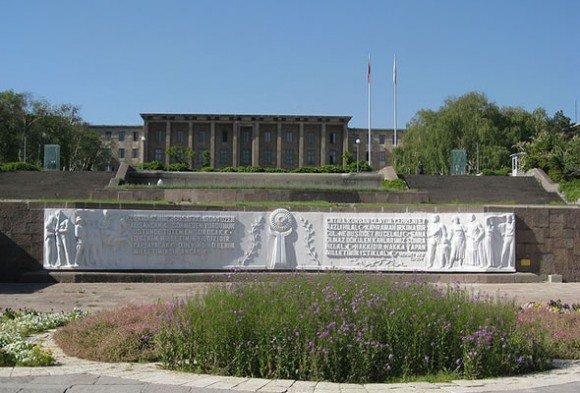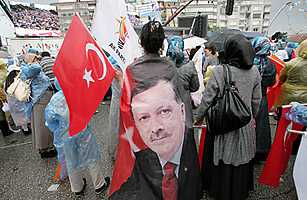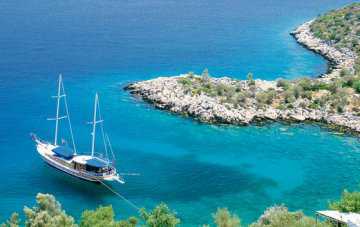By Katinka Barysch
Turkey’s election in 2007 was preceded by threats of a military coup. The 2002 one was overshadowed by an economic meltdown. This year’s poll, scheduled for June 12, could have signaled a move toward political normality.
 However, a nasty tape scandal and a flare-up of violence in the Kurdish southeast have not only poisoned the political atmosphere but also fueled allegations that the governing Justice and Development Party (AKP) wants to grab ever more power.
However, a nasty tape scandal and a flare-up of violence in the Kurdish southeast have not only poisoned the political atmosphere but also fueled allegations that the governing Justice and Development Party (AKP) wants to grab ever more power.
Polls have left little doubt that the AKP will win its third consecutive election in June as voters reward Prime Minister Recep Tayyip Erdogan for presiding over years of economic growth, relative political stability and Turkey’s growing international stature.
But Erdogan wants not only to stay in government, he wants to gain enough seats in the Parliament to push through a new constitution without having to compromise with the opposition. Since the AKP’s share of the vote stands at around 43-45 percent, Erdogan can hope for a supermajority only if the smaller of the two main opposition parties, the rightist Nationalist Movement Party (MHP) fails to pass the 10 percent bar for entry to the parliament.
Once commended for his initiatives to make up with Armenia and to give Turkey’s Kurds more minority rights, Erdogan has now adopted a nationalist tone to lure voters away from the MHP.
His chances of doing so seemed to increase in late May when videos appeared on the Internet showing leading MHP politicians in compromising situations. There is no indication that the AKP was involved, but the fact is that the party could be the main beneficiary.
Meanwhile, the electoral commission sought to bar a handful of leading Kurdish politicians from running, which led to widespread demonstrations in the southeast and raised doubts how many seats the Kurdish Peace and Democracy Party (BDP) would be able to gain.
——Erdogan moving to the right
While Erdogan is moving to the right, Kemal Kilicdaroglu, leader of the main opposition party, the nationalist-secularist People’s Republican Party (CHP) is trying a different gamble. Rather than accusing the AKP of seeking to Islamize Turkey, Kilicdaroglu has campaigned on economic opening and social safety. He has even mooted more autonomy for the Kurdish regions – something that may not go down well with the CHP’s traditional electorate. Against the background of scandals, violence and shifting party programs, it is hard to predict whether Erdogan’s reach for a supermajority will succeed. For the sake of Turkish democracy, it would be better if it did not.
Turkey does need a new, more democratic constitution. But if the AKP gains 330 of the 550 seats, it will be able to push through a constitutional draft without support from the opposition and put it straight to a referendum.
(If the AKP gained 367 seats, it could even to adopt the constitution in a parliamentary vote.) A “one-party” constitution would lead to further divisions in Turkey’s already-polarized political system. The opposition parties, together representing half of Turkey’s electorate, might well boycott a constitutional process dominated by the AKP.
Even among AKP supporters there might not be much debate: Erdogan has single-handedly struck 220 of the current 334 AKP MPs off the candidates’ list and replaced them with little-known loyalists. In a party that was once proud of its local roots, the top-down sweep has left many members cross.
Many observers suspect that Erdogan’s main objective in the new constitution is to move Turkey from a parliamentary to a presidential system along French lines. Already, the AKP has amended the current Constitution so that future presidents will no longer be elected by Parliament but by the people. The new constitution would presumably give the presidency bigger powers, commensurate with its popular mandate. Most Turks expect that Erdogan himself will want to become president when Abdullah Gul’s term expires.
In Turkey’s already highly centralized system, a move toward a presidential system does not look like a good idea. It could lead either to rivalry and paralysis between a strengthened president and a traditionally powerful prime minister, both backed by a popular mandate. Or it could further erode checks and balances and reinforce autocratic tendencies.
In either case, Turkey’s chances of getting through its daunting to-do list, from improving the judiciary to creating jobs for an eager young population, would diminish. So would its hopes of entering the European Union, which would require a strengthening of democracy and many of economic and legal reforms.
Various scandals and local violence should not distract from the fact that Turkey’s future might be at stake at this election.
***Katinka Barysch is deputy director of the Center for European Reform in London
via tehran times : Turkey’s electoral choice.




